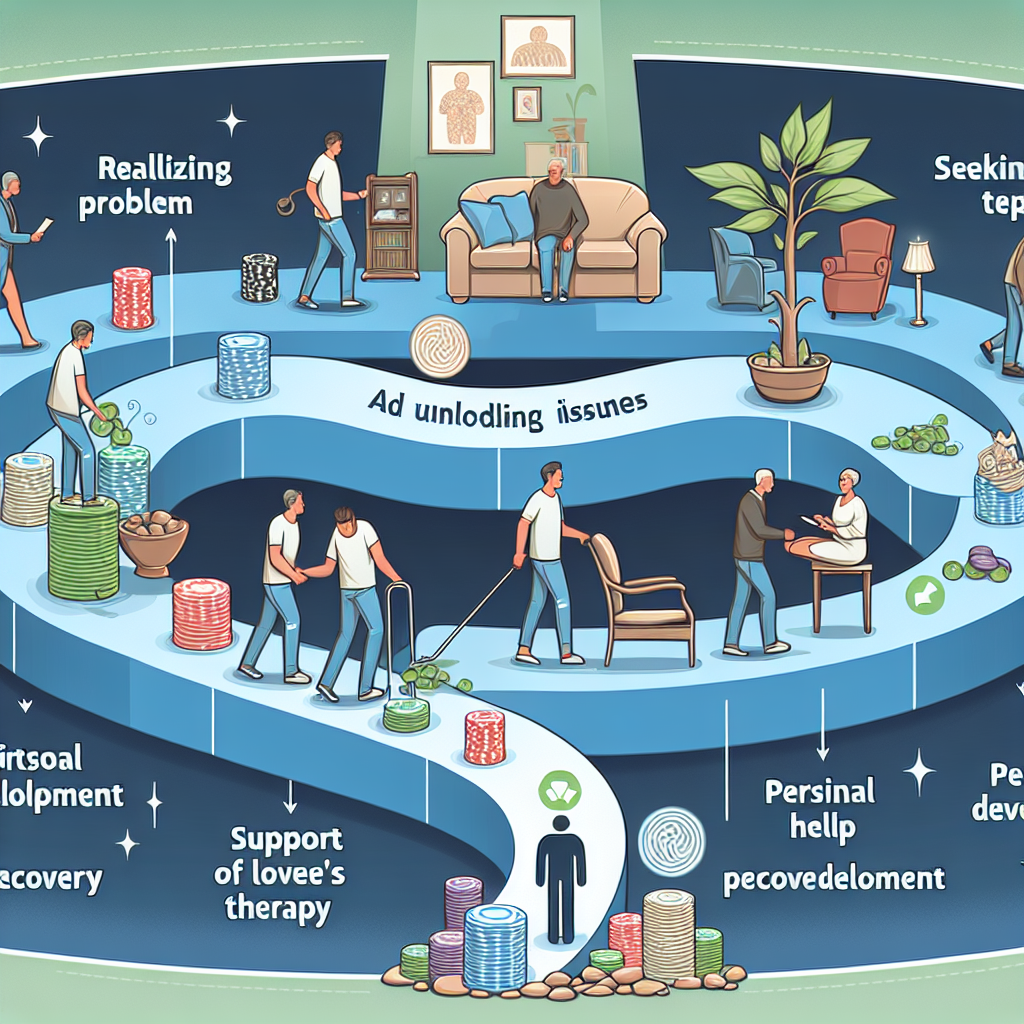-
Table of Contents

“Uncover, Understand, Overcome: Addressing the Root Causes of Gambling Addiction.”
Introduction
Addressing underlying issues in gambling addiction recovery involves a comprehensive approach that targets the root causes of the addictive behavior. This process typically includes psychological therapy to uncover and address emotional and mental health issues, such as depression, anxiety, or trauma, that may contribute to the addiction. Cognitive-behavioral therapy (CBT) is often employed to help individuals recognize and change harmful thought patterns and behaviors associated with gambling. Additionally, support groups and peer counseling provide a community of understanding and shared experiences, which can be crucial for emotional support and accountability. Medical intervention may also be necessary to manage co-occurring disorders or to provide medication-assisted treatment. Financial counseling is another critical component, helping individuals regain control over their finances and reduce the stress that can trigger gambling behavior. By addressing these underlying issues, individuals are better equipped to achieve long-term recovery and maintain a healthier, more balanced life.
Identifying and Addressing Emotional Triggers in Gambling Addiction Recovery
Gambling addiction is a complex and multifaceted issue that often extends beyond the mere act of placing bets. To achieve lasting recovery, it is crucial to identify and address the underlying emotional triggers that fuel the compulsion to gamble. Understanding these triggers can pave the way for more effective treatment strategies and a more sustainable path to recovery.
One of the first steps in addressing emotional triggers is self-awareness. Individuals must take the time to reflect on their gambling behaviors and identify the emotions that precede their urge to gamble. Common emotional triggers include stress, anxiety, loneliness, and even boredom. By recognizing these emotions, individuals can begin to understand the root causes of their addiction and take proactive steps to manage them.
Once emotional triggers are identified, it is essential to develop healthy coping mechanisms. Traditional methods such as therapy and counseling can be incredibly beneficial in this regard. Cognitive-behavioral therapy (CBT), for instance, helps individuals reframe negative thought patterns and develop healthier responses to emotional triggers. Through CBT, individuals can learn to replace the urge to gamble with more constructive activities, such as exercise, meditation, or engaging in hobbies.
In addition to therapy, building a strong support network is vital for addressing emotional triggers. Friends, family, and support groups can provide the emotional backing needed to navigate the challenges of recovery. Sharing experiences and feelings with others who understand the struggle can offer a sense of community and reduce feelings of isolation. Support groups, in particular, can be a safe space for individuals to discuss their triggers and learn from the experiences of others.
Moreover, addressing underlying issues in gambling addiction recovery often involves tackling co-occurring mental health conditions. Many individuals with gambling addiction also suffer from depression, anxiety, or other mental health disorders. Treating these conditions concurrently can significantly improve the chances of successful recovery. Mental health professionals can offer a comprehensive treatment plan that addresses both the addiction and any underlying psychological issues.
Another crucial aspect of addressing emotional triggers is lifestyle modification. Making positive changes in daily routines can help reduce the likelihood of encountering triggers. For example, individuals can create a structured schedule that includes regular physical activity, balanced nutrition, and adequate sleep. These lifestyle changes can improve overall well-being and reduce the emotional stress that often leads to gambling.
Financial management is also an important component of recovery. Financial stress is a common trigger for gambling, and learning to manage money effectively can alleviate this pressure. Financial counseling can help individuals create a budget, manage debt, and develop a plan for financial stability. By gaining control over their finances, individuals can reduce one of the significant stressors that contribute to their addiction.
Lastly, it is essential to celebrate small victories along the recovery journey. Acknowledging progress, no matter how minor, can boost self-esteem and motivation. Recovery is a long and challenging process, but recognizing achievements can provide the encouragement needed to continue moving forward.
In conclusion, addressing emotional triggers in gambling addiction recovery requires a multifaceted approach that includes self-awareness, therapy, support networks, mental health treatment, lifestyle changes, and financial management. By understanding and managing these triggers, individuals can pave the way for a more sustainable and fulfilling recovery journey. The path to recovery may be challenging, but with the right strategies and support, it is entirely achievable.
Developing Healthy Coping Mechanisms to Combat Gambling Urges
Addressing underlying issues in gambling addiction recovery is a multifaceted process that requires a comprehensive approach. One of the most crucial aspects of this journey is developing healthy coping mechanisms to combat gambling urges. These mechanisms not only help in managing the immediate desire to gamble but also play a significant role in addressing the root causes of the addiction.
To begin with, understanding the triggers that lead to gambling is essential. Triggers can be emotional, such as stress, anxiety, or depression, or situational, like financial problems or social pressures. By identifying these triggers, individuals can start to develop strategies to manage them effectively. For instance, if stress is a primary trigger, learning stress management techniques such as mindfulness, meditation, or deep-breathing exercises can be incredibly beneficial. These practices help in calming the mind and reducing the urge to seek solace in gambling.
Moreover, building a strong support system is vital in the recovery process. Engaging with family, friends, or support groups provides a sense of belonging and understanding, which can be immensely comforting. Support groups, in particular, offer a platform to share experiences and learn from others who have faced similar challenges. This collective wisdom can inspire new coping strategies and reinforce the commitment to recovery.
In addition to emotional support, developing new hobbies and interests can serve as a powerful distraction from gambling urges. Engaging in activities that bring joy and fulfillment can replace the void that gambling once filled. Whether it’s taking up a sport, learning a musical instrument, or volunteering for a cause, these activities provide a sense of purpose and achievement. They also help in building self-esteem and confidence, which are often eroded by the cycle of addiction.
Furthermore, professional help should not be overlooked. Therapists and counselors specializing in addiction can offer tailored strategies to address the underlying issues. Cognitive-behavioral therapy (CBT), for example, is highly effective in changing the thought patterns that lead to gambling. By challenging and reframing negative thoughts, individuals can develop a healthier mindset and reduce the compulsion to gamble.
Another critical aspect of developing healthy coping mechanisms is maintaining physical health. Regular exercise, a balanced diet, and adequate sleep are fundamental to overall well-being. Physical activity, in particular, has been shown to reduce stress and improve mood, making it a valuable tool in combating gambling urges. Additionally, a healthy lifestyle fosters a sense of discipline and control, which can be empowering during the recovery process.
Financial management is also a key component in addressing gambling addiction. Creating a budget, setting financial goals, and seeking advice from financial counselors can help in regaining control over one’s finances. This not only alleviates the financial stress that often accompanies gambling addiction but also instills a sense of responsibility and accountability.
Lastly, it’s important to celebrate small victories along the way. Recovery is a long and challenging journey, and acknowledging progress, no matter how minor, can boost motivation and morale. Each step forward is a testament to resilience and determination, reinforcing the belief that overcoming gambling addiction is possible.
In conclusion, developing healthy coping mechanisms to combat gambling urges involves a holistic approach that addresses emotional, social, physical, and financial aspects of life. By understanding triggers, building a support system, engaging in fulfilling activities, seeking professional help, maintaining physical health, managing finances, and celebrating progress, individuals can pave the way for a successful recovery. This journey, though arduous, is a testament to the strength of the human spirit and the possibility of a brighter, addiction-free future.
Q&A
1. **Question:** What therapeutic approaches are effective in addressing underlying issues in gambling addiction recovery?
**Answer:** Cognitive-behavioral therapy (CBT) and motivational interviewing are effective therapeutic approaches for addressing underlying issues in gambling addiction recovery.
2. **Question:** How can support groups contribute to addressing underlying issues in gambling addiction recovery?
**Answer:** Support groups like Gamblers Anonymous provide a community of peers who share experiences and strategies, which can help individuals address underlying emotional and psychological issues related to their gambling addiction.
Conclusion
Addressing underlying issues in gambling addiction recovery involves a comprehensive approach that includes therapy to uncover and treat co-occurring mental health disorders, cognitive-behavioral techniques to change harmful thought patterns, support groups for shared experiences and accountability, and lifestyle changes to reduce stress and improve overall well-being. This multifaceted strategy helps individuals understand the root causes of their addiction, develop healthier coping mechanisms, and build a sustainable path to recovery.



